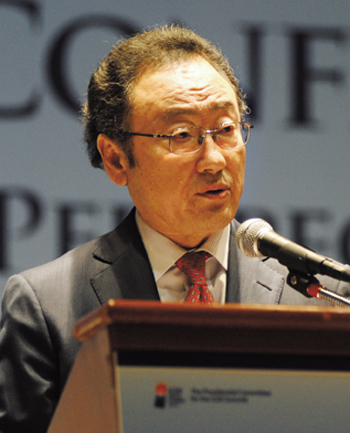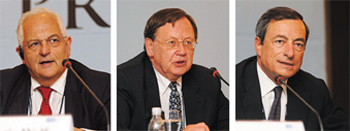Bridging Advanced and Emerging Nations
Korea plays the role of bringing the world together in setting up a global financial safety net through the G20 Summit
 The Presidential Committee for the G20 Summit in Seoul hosted the ¡°Korea-FSB Financial Reform Conference: An Emerging Market Perspective¡± on Sept. 2-3 at the Seoul Grand InterContinental Hotel. The meeting was aimed at financial reform issues for emerging countries that are to be dealt with at the upcoming G20 Summit on Nov. 11-12 in Seoul.
The Presidential Committee for the G20 Summit in Seoul hosted the ¡°Korea-FSB Financial Reform Conference: An Emerging Market Perspective¡± on Sept. 2-3 at the Seoul Grand InterContinental Hotel. The meeting was aimed at financial reform issues for emerging countries that are to be dealt with at the upcoming G20 Summit on Nov. 11-12 in Seoul.
Korea, as the chair nation for the G20 Summit in Seoul, wanted to expand the participation of emerging countries in the discussion of G20 financial regulations, strengthen the stability of the foreign exchange market and cooperation among international financial authorities, while at the same time strengthen the roles of the financial authorities in emerging countries so that the upcoming G20 Seoul Summit would include some of those issues as part of its agenda.
Korea wanted to take the opportunity to play the role of a bridge linking advanced and emerging countries as the first non-G-8 chair nation of a G20 Summit. Over 500 government officials, representatives of international organizations, financial firms, media and academics attended the conference. Gov. Kim Choong-soo of the Bank of Korea in his speech at the gathering said he will explore some key issues of macro-prudential policy in respect to financial reform. His speech was entitled, ¡°Macro-Prudential Policy as a New Ground for Financial Stability.¡±
The central bank governor said the policy framework for ensuring financial stability has historically needed reforming at times in order to reflect changing trends in the financial industry. And as these reforms were undertaken, the roles of the financial authorities including central banks and supervisory institutions have changed accordingly.
Prior to the outbreak of the global financial crisis in 2008, financial authorities exercised surveillance and supervision with a focus on the soundness of individual financial institutions, and with the aim of heightening their management stability on the micro-level.
Since the crisis, however, recognition has become widespread that financial stability cannot be achieved only through market discipline and micro-prudential policy, and this perception has brought the issue of a macro-prudential policy framework to the fore. He said macro-prudential policy has accordingly come to be seen as the ¡®missing pillar¡¯ in the edifice of financial stability.
Kim said that for some time now, Korea, as chair country of the G20 Summit, has played a leading role in the discussions on the construction of a global financial safety net (GFSN). Korea has proposed the reestablishment of a multi-layered GFSN, known as the ¡®Korea Initiative,¡¯ consisting of a bilateral regional and global arrangement. In this connection, Korea has recently been pushing ahead, together with the IMF, on a proposal for the improvement of the IMF¡¯s existing Flexible Credit Line (FCL) scheme and the setting-up of an additional Precautionary Credit Line (PCL).
Chairman Sakong Il of the Presidential Committee of the G20 Seoul Summit, co-host of the conference, said there are few disputes about the G20¡¯s positive role towards stabilizing the global economy. With the G20-led globally-concerted efforts, the global economy was able to avoid another Great Depression. The G20, so far, has also been successful in distinguishing itself from other similar forums by producing concrete, implementable measures. nw
Chairman Sakong Il of the Presidential Committee of the G20 Summit in Seoul, gives a speech at the Korea-FSB Financial Reform Conference: An Emerging Market Perspective in Seoul.; Financial Journalist Martin Wolf of the Financial Times of London.; President Nout Wellink of the Basel Committee of the Banking Supervision.; Chairman Mario Draghi of the Financial Stability Board.
3Fl, 292-47, Shindang 6-dong, Chung-gu, Seoul, Korea 100-456
Tel : 82-2-2235-6114 / Fax : 82-2-2235-0799